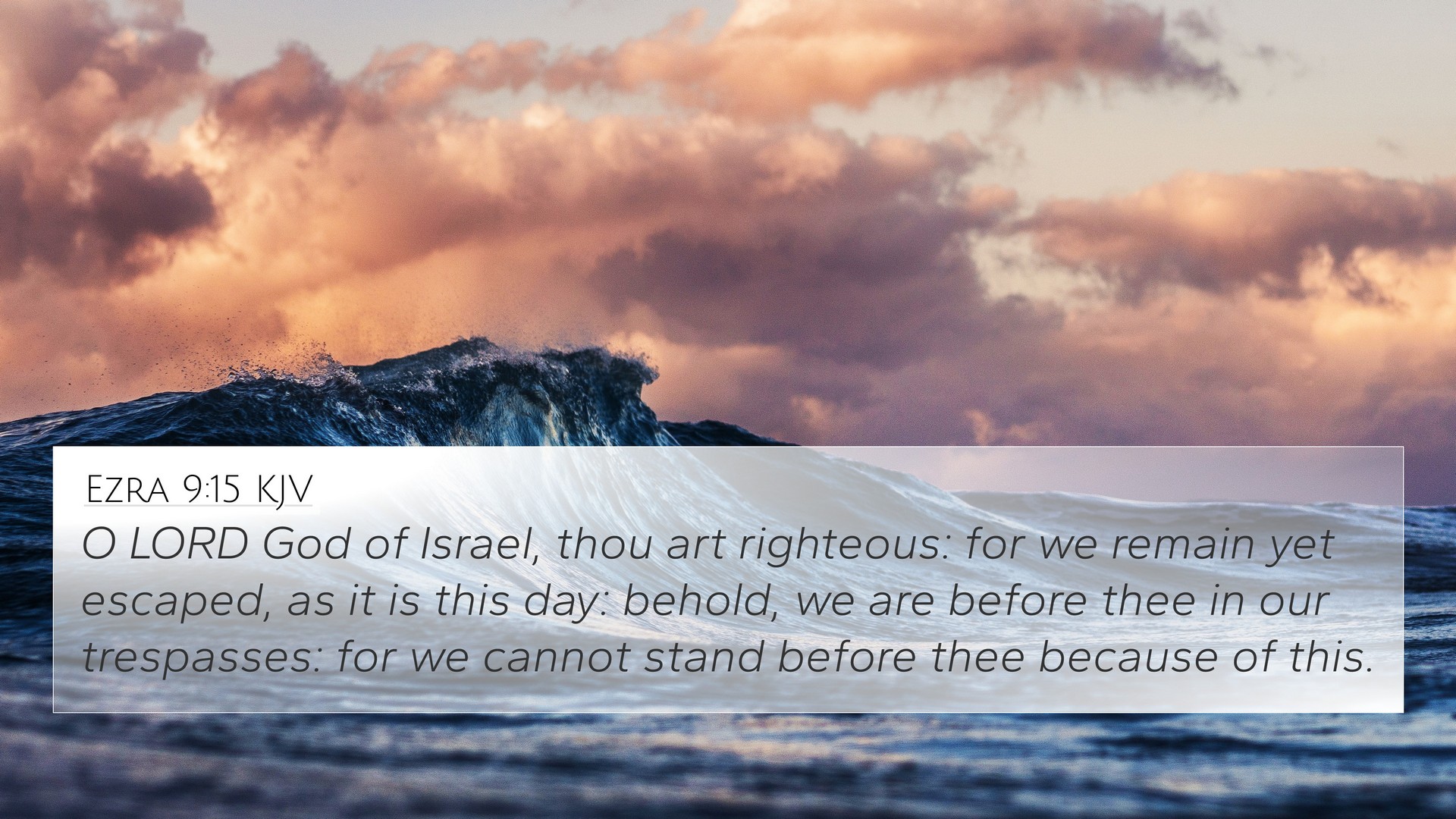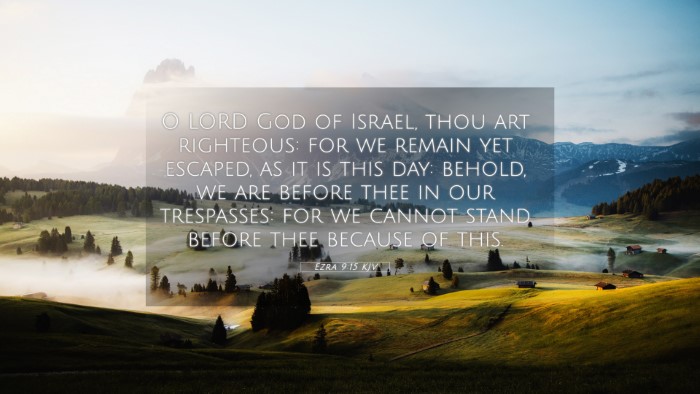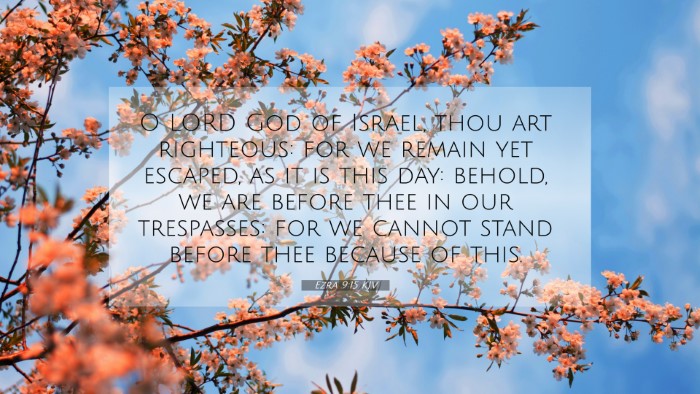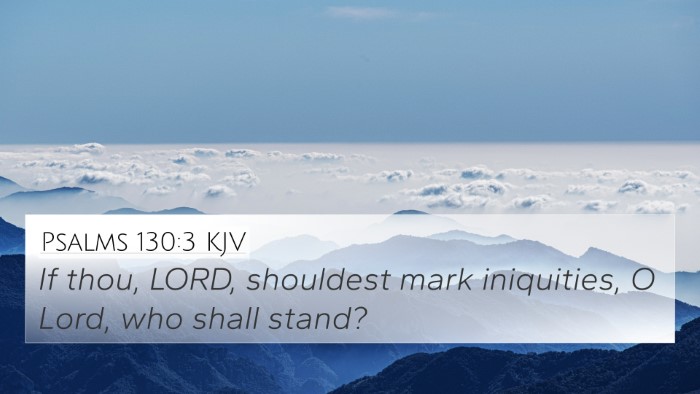Old Testament
Genesis Exodus Leviticus Numbers Deuteronomy Joshua Judges Ruth 1 Samuel 2 Samuel 1 Kings 2 Kings 1 Chronicles 2 Chronicles Ezra Nehemiah Esther Job Psalms Proverbs Ecclesiastes Song of Solomon Isaiah Jeremiah Lamentations Ezekiel Daniel Hosea Joel Amos Obadiah Jonah Micah Nahum Habakkuk Zephaniah Haggai Zechariah MalachiEzra 9:15 Similar Verses
Ezra 9:15 Cross References
O LORD God of Israel, thou art righteous: for we remain yet escaped, as it is this day: behold, we are before thee in our trespasses: for we cannot stand before thee because of this.
Uncover the Rich Themes and Topics of This Bible Verse
Listed below are the Bible themes associated with Ezra 9:15. We invite you to explore each theme to gain deeper insights into the Scriptures.
Ezra 9:15 Cross Reference Verses
This section features a detailed cross-reference designed to enrich your understanding of the Scriptures. Below, you will find carefully selected verses that echo the themes and teachings related to Ezra 9:15 KJV. Click on any image to explore detailed analyses of related Bible verses and uncover deeper theological insights.
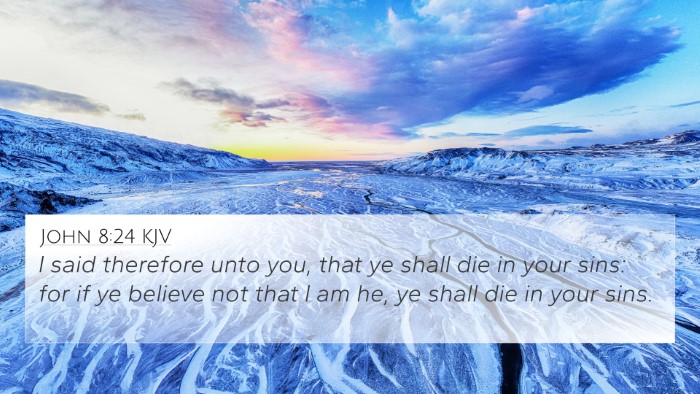
John 8:24 (KJV) »
I said therefore unto you, that ye shall die in your sins: for if ye believe not that I am he, ye shall die in your sins.
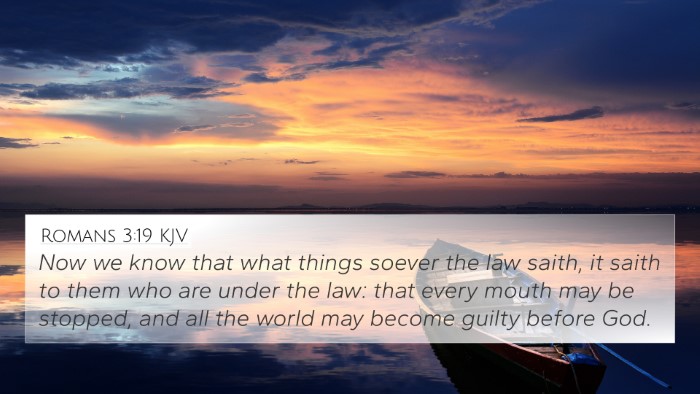
Romans 3:19 (KJV) »
Now we know that what things soever the law saith, it saith to them who are under the law: that every mouth may be stopped, and all the world may become guilty before God.
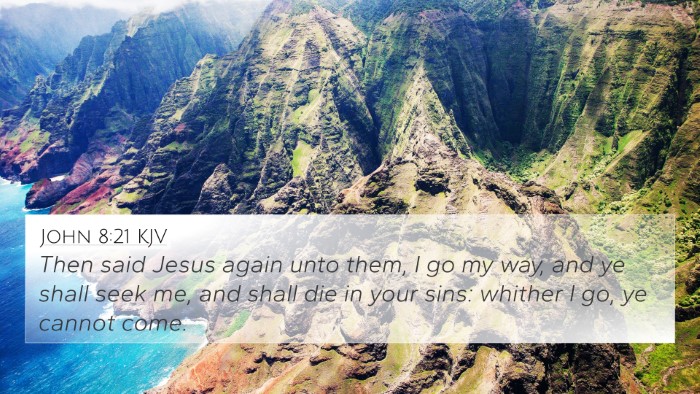
John 8:21 (KJV) »
Then said Jesus again unto them, I go my way, and ye shall seek me, and shall die in your sins: whither I go, ye cannot come.

Nehemiah 9:33 (KJV) »
Howbeit thou art just in all that is brought upon us; for thou hast done right, but we have done wickedly:
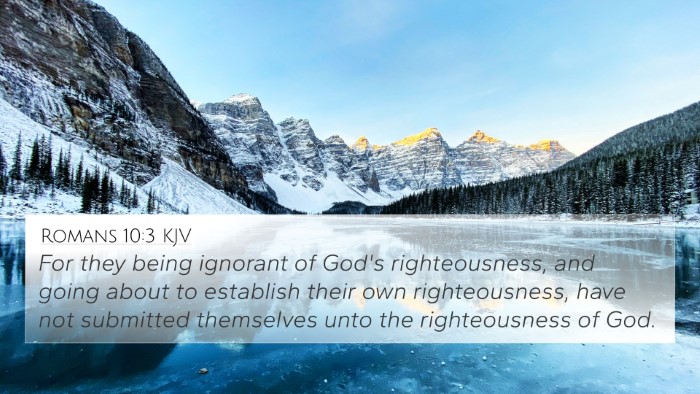
Romans 10:3 (KJV) »
For they being ignorant of God's righteousness, and going about to establish their own righteousness, have not submitted themselves unto the righteousness of God.
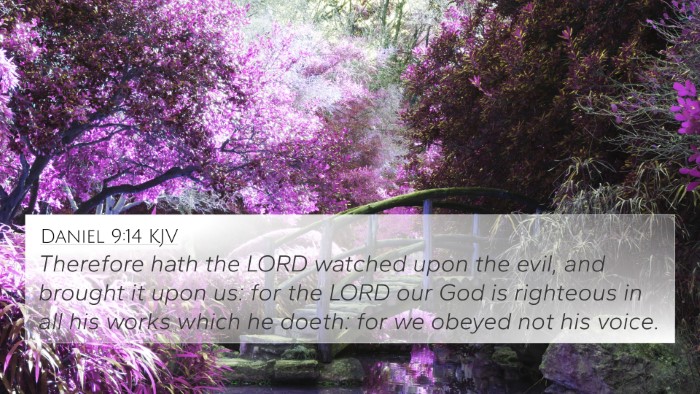
Daniel 9:14 (KJV) »
Therefore hath the LORD watched upon the evil, and brought it upon us: for the LORD our God is righteous in all his works which he doeth: for we obeyed not his voice.
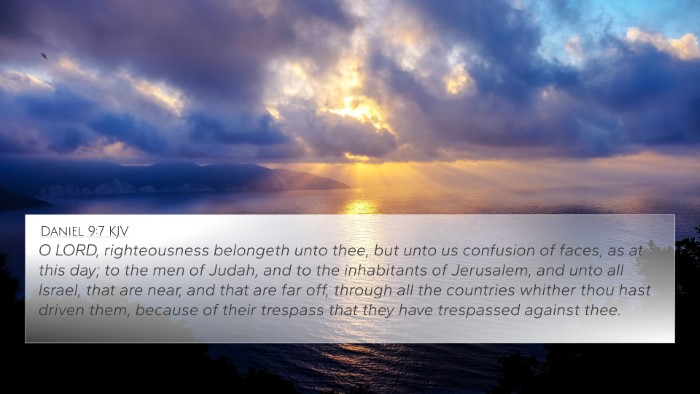
Daniel 9:7 (KJV) »
O LORD, righteousness belongeth unto thee, but unto us confusion of faces, as at this day; to the men of Judah, and to the inhabitants of Jerusalem, and unto all Israel, that are near, and that are far off, through all the countries whither thou hast driven them, because of their trespass that they have trespassed against thee.
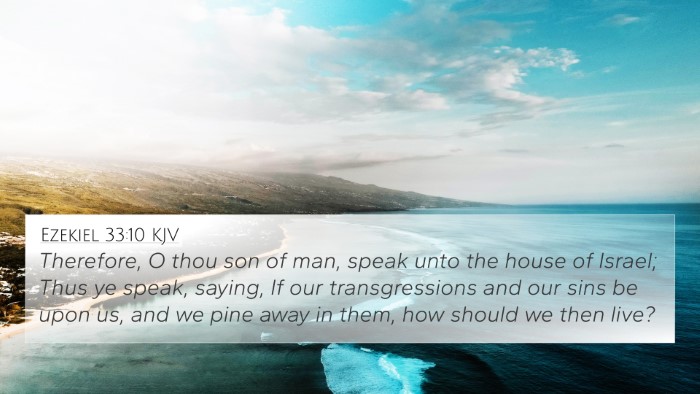
Ezekiel 33:10 (KJV) »
Therefore, O thou son of man, speak unto the house of Israel; Thus ye speak, saying, If our transgressions and our sins be upon us, and we pine away in them, how should we then live?
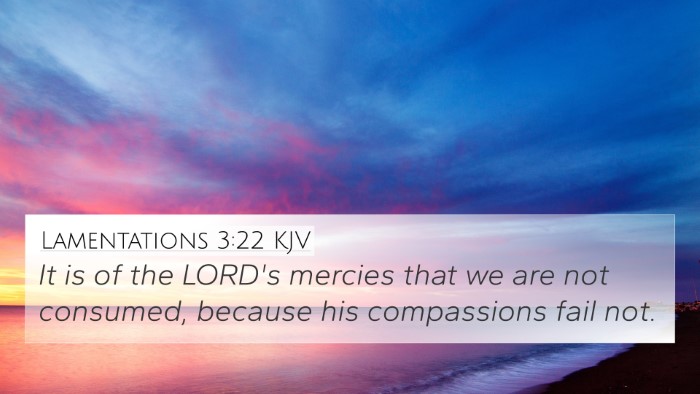
Lamentations 3:22 (KJV) »
It is of the LORD's mercies that we are not consumed, because his compassions fail not.
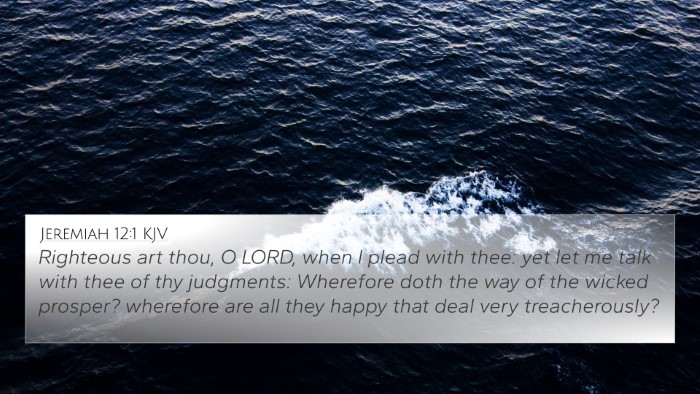
Jeremiah 12:1 (KJV) »
Righteous art thou, O LORD, when I plead with thee: yet let me talk with thee of thy judgments: Wherefore doth the way of the wicked prosper? wherefore are all they happy that deal very treacherously?

Isaiah 64:6 (KJV) »
But we are all as an unclean thing, and all our righteousnesses are as filthy rags; and we all do fade as a leaf; and our iniquities, like the wind, have taken us away.
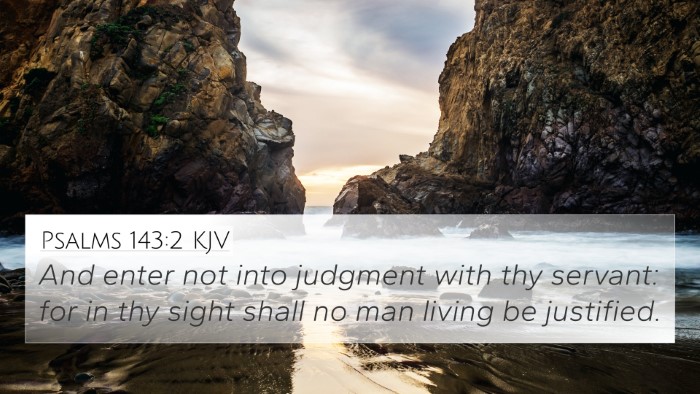
Psalms 143:2 (KJV) »
And enter not into judgment with thy servant: for in thy sight shall no man living be justified.
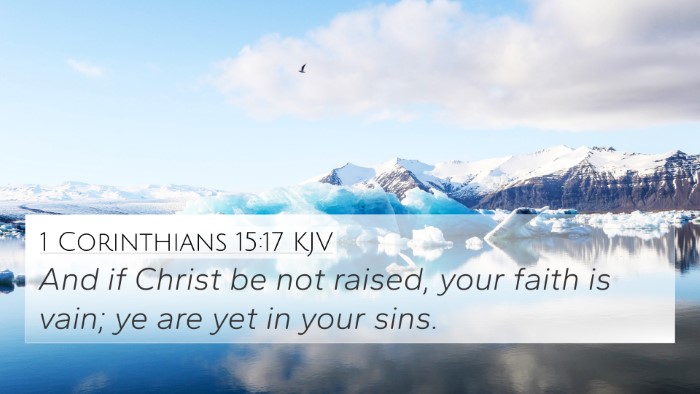
1 Corinthians 15:17 (KJV) »
And if Christ be not raised, your faith is vain; ye are yet in your sins.
Ezra 9:15 Verse Analysis and Similar Verses
Understanding Ezra 9:15
Ezra 9:15 reads:
"O Lord God of Israel, thou art righteous; for we remain yet escaped, as it is this day: behold, we are before thee in our trespasses; for we cannot stand before thee because of this."
Summary of Insights
This verse captures a moment of deep contrition where Ezra acknowledges the righteousness of God while simultaneously recognizing the sins of the people. Ezra's confession highlights the unworthiness of Israel in comparison to God's holiness and justice.
Commentary Insights
-
Matthew Henry:
Matthew Henry emphasizes the importance of acknowledging God's righteousness, stating that Ezra sees God’s grace despite Israel's failings. Henry points out that Ezra appeals to God's justice, revealing the depth of Israel's sinfulness, and encourages believers to confess their sins honestly before God.
-
Albert Barnes:
Albert Barnes notes that Ezra's prayer reflects an understanding of divine justice, asserting that God's righteousness stands in sharp contrast to human iniquity. He discusses how straying from God's commandments leads to dire consequences, and thus Ezra’s plea is both a confession and a recognition of the need for divine mercy.
-
Adam Clarke:
Adam Clarke provides a contextual analysis, indicating that Ezra's prayer occurs in a time of national repentance. Clarke highlights the phrase "we cannot stand before thee because of this," illustrating the gravity of sin and the need for humility in seeking God's forgiveness.
Key Themes
The themes elucidated in Ezra 9:15 can be connected to various important biblical principles such as:
- Confession of Sins: The necessity of admitting our failings before God.
- Divine Righteousness: The nature of God as inherently just.
- God's Mercy: The hope for forgiveness despite human unworthiness.
Bible Verse Cross-References
Ezra 9:15 connects with several other scriptures. Here is a list of cross-references that are essential for a deeper understanding:
- Psalms 130:3-4: "If thou, Lord, shouldest mark iniquities, O Lord, who shall stand? But there is forgiveness with thee, that thou mayest be feared." – highlights the need for forgiveness.
- Isaiah 53:6: "All we like sheep have gone astray; we have turned every one to his own way; and the Lord hath laid on him the iniquity of us all." – speaks to the universality of sin.
- Romans 3:23: "For all have sinned, and come short of the glory of God." – confirms the collective nature of human sin.
- 1 John 1:9: "If we confess our sins, he is faithful and just to forgive us our sins, and to cleanse us from all unrighteousness." – emphasizes the importance of confession.
- Proverbs 28:13: "He that covereth his sins shall not prosper: but whoso confesseth and forsaketh them shall have mercy." – reinforces confessing as a means to find mercy.
- Hebrews 4:13: "Neither is there any creature that is not manifest in his sight: but all things are naked and opened unto the eyes of him with whom we have to do." – a reminder of God’s omniscience regarding our sins.
- Lamentations 3:22-23: "It is of the Lord's mercies that we are not consumed, because his compassions fail not. They are new every morning: great is thy faithfulness." – assures us of God's continuous mercy.
Connecting Themes Across the Bible
The essence of human sin and the necessity for divine mercy is a recurring theme throughout the Bible. By examining these connections, we can gain insight into:
- Tools for Bible Cross-Referencing: Utilizing a Bible concordance can aid in finding these connections.
- Bible Cross-Reference Guide: Employing methods of cross-referencing can enrich study and comprehension.
- Cross-Reference Bible Study: Engaging in comparative verse analysis can broaden understanding.
- How to Use Bible Cross-References: Learning about cross-referencing Bible study methods helps in theological reflection.
Conclusion
Through Ezra 9:15, we see a poignant illustration of humility and the need for divine grace. This verse not only invites believers to reflect upon their relationship with God but also to recognize the interconnectedness of scripture through themes of sin, confession, and divine mercy. By studying and cross-referencing with related verses, one can deepen their understanding and faith.
